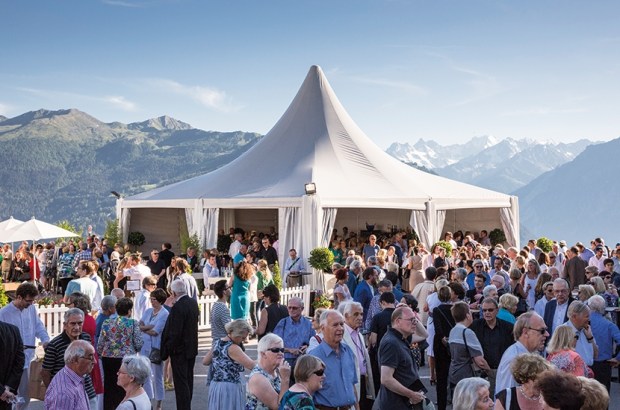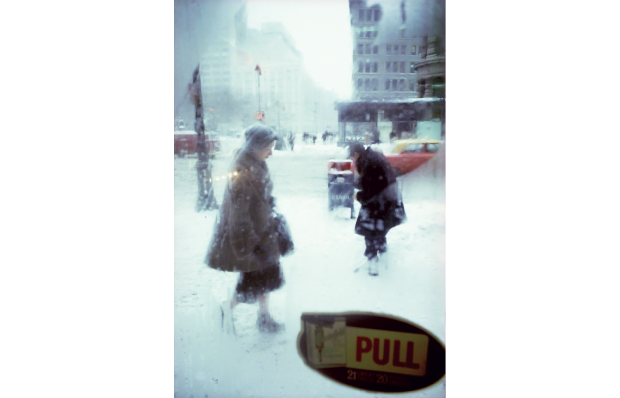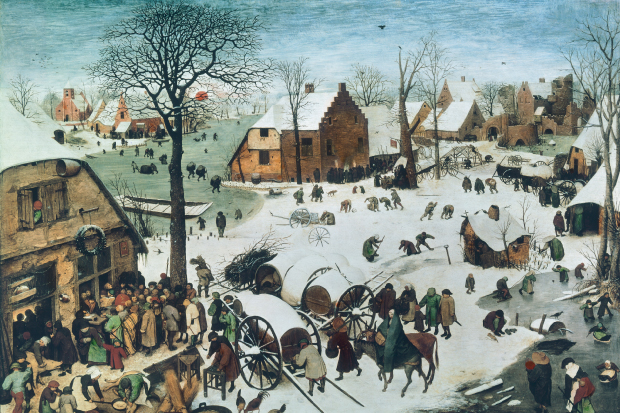It may be the last water-cooler moment in world television. On the first morning of the year, at 11.15 Central European Time, in a place that considers itself the epicentre of Europe, a group of men in formal dress mount the Musikvereinssaal stage in Vienna to perform a ritual that passes for culture and tradition. It is, of course, neither.
The music is strictly bar-room, written by members of the Strauss family as social foreplay for the soldiery and serving classes in low taverns. Like most forms of dirty dancing, the music rose vertically from barroom to ballroom and was soon performed as encores by symphonic orchestras to dowager purrs of wie schön.
The New Year’s Day concert is an annual jellybox of waltzes, polkas, galops, marches and any old tritsch-trash. It is watched by 60 million people in 90 countries, a triumph of brand marketing over musical substance, with a smiley tag of ‘hope, friendship and peace’. Its cultural value is equal to a double-dollop of tourist kitsch. Harmless, unless you are weight-watching.
The tradition, however, is decidedly pernicious. This concert came into being as a gift to Nazi criminals, a cover for genocide. The Vienna Philharmonic was quick to sack Jewish and leftist musicians when Hitler came to town. More than a dozen were sent to concentration camps; seven of them perished. The orchestra unanimously endorsed the Anschluss with Germany, exhorted by the conductor Karl Böhm to declare ‘a 100 per cent “yes”’, and proved a willing executioner of cultural cleansing, removing Mahler and other giants from its walls and histories.
But racist revisionism yielded no instant reward. Vienna was downgraded by the Nazis to a provincial capital and the Philharmonic feared losing status. So the players went wooing Baldur von Schirach, the Vienna Gauleiter, a lover of music who would send 65,000 Viennese Jews to their deaths.
Schirach had signed off the first Strauss concert on 31 December 1939, funnelling its proceeds to the Nazi Kriegwinterhilfswerk charity. From 1941, he made the Strauss concert an annual event. It was conducted by the Nazified Clemens Krauss, later by the immaculate concertmaster Willi Boskovsky. Wie schön, sighed the dowagers.
The Nazi origins were suppressed until last year when a historian discovered that the Philharmonic had given its ring of honour to six mass-murderers, including Schirach; the butcher of Holland, Arthur Seyss-Inquart; and the head of Reich railways who ran the trains to Auschwitz. Those honours weren’t revoked until 2013 and some of the criminals could be seen attending Philharmonic concerts into the 1960s.
Look around the glittering audience of business chiefs, celebrities, politicians and diplomats on New Year’s morning and it is not hard to picture their predecessors in black in the same plush seats. Wien bleibt Wien — Vienna never changes — is the city’s motto. Its defining characteristic, noted by Sigmund Freud, is Schein über Sein — looking good is better than being good. Appearance, in Vienna, counts most.
After decades of whitewashing its history, the orchestra has come half-clean under pressure in the past few years, but you don’t have to scratch very deep to find enduring Nazi legacies. Karl Böhm, a brilliant conductor but not a very bright man, used to say that ‘the Nazis aren’t that bad — they want to eliminate women from politics.’ Many in the Vienna Philharmonic would agree with that.
The orchestra has, until recently, excluded women. One of the perverse pleasures of watching the New Year’s Day broadcast is to count how few females are permitted to take part. The orchestra has just seven women members out of a roll call of 130, the lowest in any 21st-century symphony orchestra.
Sex discrimination is illegal under Austrian and European law. Three years ago Parliament penalised the Philharmonic with a €2.29 million funding cut (only for the money to be repaid by sympathetic officials through a back door).
In defence of their closed shop, musicians maintain that their playing style is passed from father to son, cousin to cousin, preserving the last recognisable sound in an over-homogenised concert world. The nepotists have a point. No other orchestra achieves Vienna’s saccharine sleekness in Strauss, its ironic detachment in Mahler.
But the sound is obtained at the expense of unacceptable prejudice. Asian and women players who win competitive auditions to the orchestra of the Vienna Opera, where they play alongside VPO members, are humiliatingly excluded from the men’s club — the male conspiracy — that is the Vienna Philharmonic Orchestra.
Most, in this day and age, find such attitudes unacceptable. The Philharmonic has faced demonstrations and legal threats on tour in the United States. But not at home, never on New Year’s Day.
So long as appearance defeats substance — so long as the world oohs and ahhs at the musical sweetmeats and ignores the dirt in the kitchen, New Year’s Day from Vienna will remain a family favourite, a testament to our human ability to look the other way.
Got something to add? Join the discussion and comment below.
Get 10 issues for just $10
Subscribe to The Spectator Australia today for the next 10 magazine issues, plus full online access, for just $10.
© Norman Lebrecht
You might disagree with half of it, but you’ll enjoy reading all of it. Try your first month for free, then just $2 a week for the remainder of your first year.













Comments
Don't miss out
Join the conversation with other Spectator Australia readers. Subscribe to leave a comment.
SUBSCRIBEAlready a subscriber? Log in